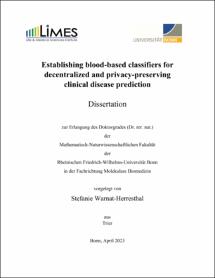Warnat-Herresthal, Stefanie: Establishing blood-based classifiers for decentralized and privacy-preserving disease prediction. - Bonn, 2024. - Dissertation, Rheinische Friedrich-Wilhelms-Universität Bonn.
Online-Ausgabe in bonndoc: https://nbn-resolving.org/urn:nbn:de:hbz:5-75619
Online-Ausgabe in bonndoc: https://nbn-resolving.org/urn:nbn:de:hbz:5-75619
@phdthesis{handle:20.500.11811/11481,
urn: https://nbn-resolving.org/urn:nbn:de:hbz:5-75619,
doi: https://doi.org/10.48565/bonndoc-260,
author = {{Stefanie Warnat-Herresthal}},
title = {Establishing blood-based classifiers for decentralized and privacy-preserving disease prediction},
school = {Rheinische Friedrich-Wilhelms-Universität Bonn},
year = 2024,
month = apr,
note = {Big data is increasingly being generated across all sectors of medicine and high-dimensional omics data have been shown to be a powerful data space for AI applications that can assist in primary and differential diagnostics, therapeutic decision making, disease outcome prediction and clinical planning, as well as for an improved understanding of disease pathophysiology. Particularly blood transcriptomics was shown to be informative for a variety of machine learning tasks while at the same time being a technology that is clinically feasible.
This thesis first exemplifies the enormous potential of leveraging AI for medical diagnosis by demonstrating that accurate prediction of Acute Myeloid Leukemia is possible on a large reference dataset across more than 120 independent studies covering two microarray platforms as well as bulk RNA-sequencing data. A large range of clinically relevant scenarios are evaluated, addressing several bottlenecks on the path towards clinical deployment of this technology. I provide evidence that accurate prediction of AML by near-automated machine learning algorithms based on high-dimensional omics data is possible. At the same time, translation of these possibilities into clinical practice is not happening yet due to limitations which are inherent to the health care sector. Mainly, aggregation of datasets which are sufficiently large to train robust classifiers that are generalizable across sites is not feasible due to strict regulations on data privacy. To overcome this obstacle, I introduce Swarm Learning in my thesis as a new framework for collaborative and decentral machine learning based on blockchain technology. I am showing that SL enables training of accurate classification algorithms which outperform local models across a wide range of scenarios predicting AML, tuberculosis, COVID-19 and lung diseases utilizing even different medical data spaces, while at the same time preserving data privacy.
Consequently, I propose a new approach to be included into the development of routine diagnostics in the health care sector, which utilizes the power of machine learning for physicians to extract information from high-dimensional molecular data for data-driven prediction of disease or therapy outcome, thereby augmenting clinical decision making and ultimately leading to a more precise approach to medicine, while at the same time acknowledging data privacy and the need for democratic structures in collaborative machine learning across the health care sector.},
url = {https://hdl.handle.net/20.500.11811/11481}
}
urn: https://nbn-resolving.org/urn:nbn:de:hbz:5-75619,
doi: https://doi.org/10.48565/bonndoc-260,
author = {{Stefanie Warnat-Herresthal}},
title = {Establishing blood-based classifiers for decentralized and privacy-preserving disease prediction},
school = {Rheinische Friedrich-Wilhelms-Universität Bonn},
year = 2024,
month = apr,
note = {Big data is increasingly being generated across all sectors of medicine and high-dimensional omics data have been shown to be a powerful data space for AI applications that can assist in primary and differential diagnostics, therapeutic decision making, disease outcome prediction and clinical planning, as well as for an improved understanding of disease pathophysiology. Particularly blood transcriptomics was shown to be informative for a variety of machine learning tasks while at the same time being a technology that is clinically feasible.
This thesis first exemplifies the enormous potential of leveraging AI for medical diagnosis by demonstrating that accurate prediction of Acute Myeloid Leukemia is possible on a large reference dataset across more than 120 independent studies covering two microarray platforms as well as bulk RNA-sequencing data. A large range of clinically relevant scenarios are evaluated, addressing several bottlenecks on the path towards clinical deployment of this technology. I provide evidence that accurate prediction of AML by near-automated machine learning algorithms based on high-dimensional omics data is possible. At the same time, translation of these possibilities into clinical practice is not happening yet due to limitations which are inherent to the health care sector. Mainly, aggregation of datasets which are sufficiently large to train robust classifiers that are generalizable across sites is not feasible due to strict regulations on data privacy. To overcome this obstacle, I introduce Swarm Learning in my thesis as a new framework for collaborative and decentral machine learning based on blockchain technology. I am showing that SL enables training of accurate classification algorithms which outperform local models across a wide range of scenarios predicting AML, tuberculosis, COVID-19 and lung diseases utilizing even different medical data spaces, while at the same time preserving data privacy.
Consequently, I propose a new approach to be included into the development of routine diagnostics in the health care sector, which utilizes the power of machine learning for physicians to extract information from high-dimensional molecular data for data-driven prediction of disease or therapy outcome, thereby augmenting clinical decision making and ultimately leading to a more precise approach to medicine, while at the same time acknowledging data privacy and the need for democratic structures in collaborative machine learning across the health care sector.},
url = {https://hdl.handle.net/20.500.11811/11481}
}






